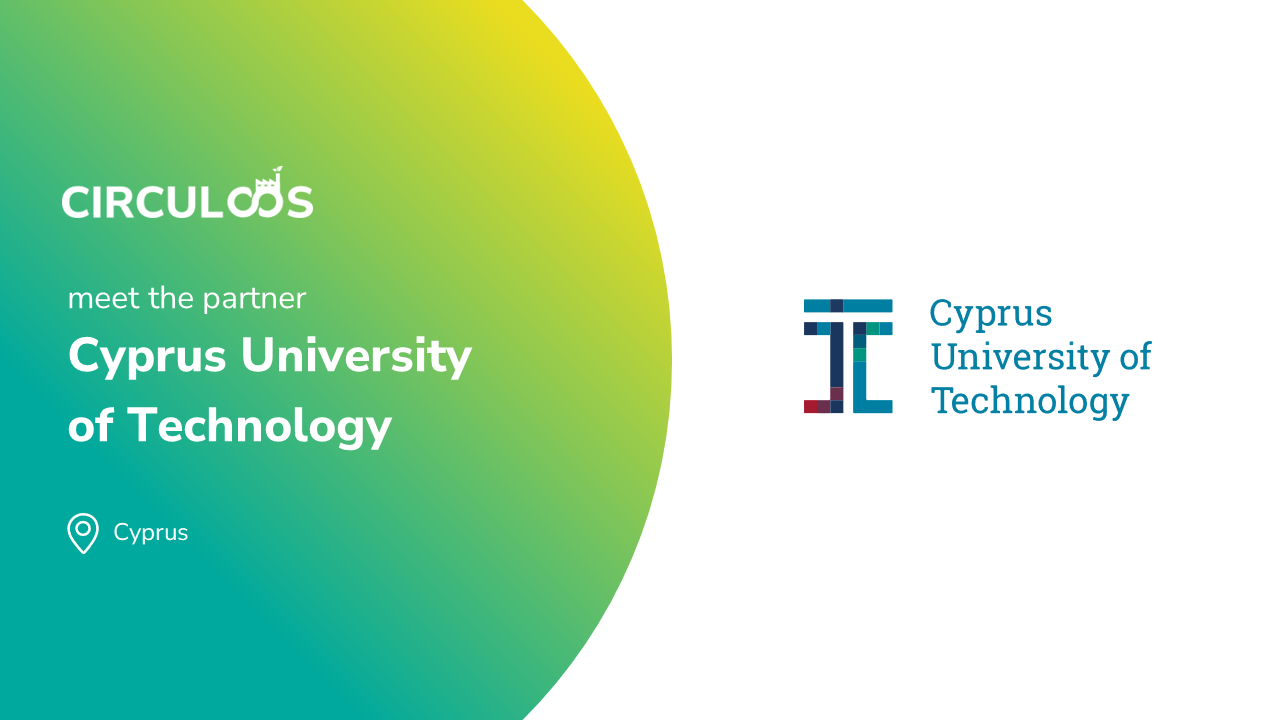The Cyprus University of Technology (CUT), located in Limassol, is a public university renowned for its focus on applied research and its strong educational offerings. With faculties spanning Engineering and Technology, Health Sciences, Fine and Applied Arts, Communication and Media Studies, and Geotechnical Sciences and Environmental Management, CUT excels in integrating teaching with research, especially in fields related to its Mediterranean setting, such as marine and environmental sciences. This alignment enables the university to contribute significantly to both local and international scientific communities.
Explain your role in the CIRCULOOS project.
RCDS is one of the DIHs that comprise the CIRCULOOS network. We both contribute to and gain benefits from CIRCULOOS in various ways. Firstly, we are responsible for the development of the circularity enablers of the Supply Chain Optimization (SCOPT) module and the Digital Twin (DT) which we are currently developing. Secondly, we will mentor several Experiment Demonstrators (EXDs) both as application and as technical mentors.
How does the Cyprus University of Technology plan to incorporate lessons from the H2020 L4MS and Better Factory projects into executing demonstrations for the CIRCULOOS project?
The Supply Chain Optimization (SCOPT) module will further develop the Business Process Optimization (BPO) module, which was developed in the H2020 L4MS and Better Factory projects and it is currently available on the RAMP marketplace, by incorporating machine learning techniques to extract formal models for the various actors of the supply chain.
The SCOPT is an AI model and data-driven module that it will be used to provide global (i.e. between the factory and the suppliers) and local (within the factory) supply chain optimizations and predictive analytics based on the system model and the data acquired by the SMEs. Additionally, a GUI implementation will be developed to enable real-time visibility of the running solution. Moreover, SCOPT will contribute to the development of the internal and external actor models for the use cases and for the failure modes to enable the risk analysis and mitigation.
What is a digital twin, and how will you use it within the CIRCULOOS project to enable sustainability and circularity?
The Digital Twin (DT) will be created using the open-source solutions of the ROS – Gazebo framework that will be implemented to enable the 3D Factory and Product Digital Twin. The DT is a digital representation of the supply chain actors that allows the analysis, the data quality control, and the easy reconfiguration of ecosystems towards alternative scenarios creation and sustainability and circularity assessment computation. The DT addresses: i) real-time mirroring of physical supply chains and data flows; ii) fast comparison between back or estimated data and real-time data; iii) simulation of well-known situations, characterized by certain boundary conditions, meant to forecast the reaction of the real environment; iv) feed the knowledge base on which AI-based tools are leveraging on and v) autonomous evolution of the represented system.
What is the role of data and AI within the project?
AI and machine learning techniques for supply chain optimization are typically focused on predicting the future demand and sales, personalized product recommendations, inventory optimization with correct stock levels, predictive maintenance, routing optimization for product delivery and warehouse management.
The Supply Chain Optimization (SCOPT) module exploits combinatorial optimizations techniques and implements a custom model checking engine with the capability to incorporate formal models that are derived either from analytic or data driven AI techniques, enabling the exploitation of the data available on RAMP to learn the behavioral models of supply chain actors.
How do you foresee the execution of the pilots and their outcomes?
During the CIRCULOOS project, RCDS-CUT lab expects to gain and expand our experience in supply chain optimization techniques and tools. CIRCULOOS network will help us expand our offerings and our expertise and attract funding and authorities which are looking for AI and data driven solutions for supply chain monitoring and optimization.
What potential challenges do you foresee in executing demonstrations?
One of the challenges that we foresee in executing demonstrations is the exploitation and the prediction of assessment results into the decision-making process across the supply chain using LCA tools composed at each point in time.
What is your future vision of the project?
In CIRCULOOS Project, we aim to specify the diverse industrial sectors in terms of data and lifecycle modelling, indicate the different stakeholders needs in terms of results interpretations, and offer customized GUIs.
How will the Circular Economy change the manufacturing sector?
The circular economy aims to reduce material use by preventing losses in the product lifecycle. CIRCULOOS aims to deliver the tools to enable MSMEs to become full members of the Circular Manufacturing value chain.


